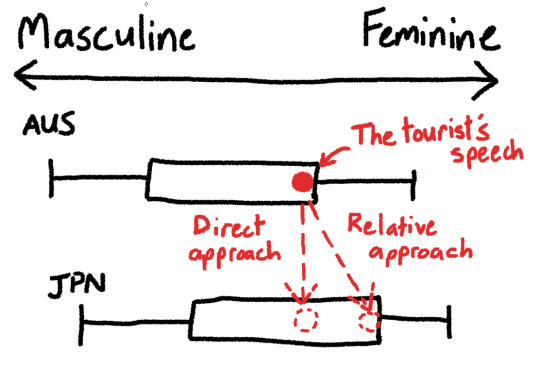#BLOG LANGUAGE TRANSLATION
Explore tagged Tumblr posts
Text
Gendered pronouns in Japanese vs English
In Revolutionary Girl Utena, the main character Utena is a girl (it says so in the title), but very conspicuously uses the masculine first person pronoun 僕 (boku) and dresses in (a variation of) the boys school uniform. Utena's gender, and gender in general, is a core theme of the work. And yet, I haven’t seen a single translation or analysis post where anyone considers using anything other than she/her for Utena when speaking of her in English. This made me wonder: how does one’s choice of pronouns in Japanese correspond to what one’s preferred pronouns would be in English?

There are 3 main differences between gendered pronouns in Japanese vs English
Japanese pronouns are used to refer to yourself (first-person), while English pronouns are used to refer to others (third-person)
The Japanese pronoun you use will differ based on context
Japanese pronouns signify more than just gender
Let’s look at each of these differences in turn and how these differences might lead to a seeming incongruity between one’s Japanese pronoun choice and one’s English pronoun choice (such as the 僕 (boku) vs she/her discrepancy with Utena).
Part 1: First-person vs third-person
While Japanese does technically have gendered third person pronouns (彼、彼女) they are used infrequently¹ and have much less cultural importance placed on them than English third person pronouns. Therefore, I would argue that the cultural equivalent of the gender-signifying third-person pronoun in English is the Japanese first-person pronoun. Much like English “pronouns in bio”, Japanese first-person pronoun choice is considered an expression of identity.
Japanese pronouns are used exclusively to refer to yourself, and therefore a speaker can change the pronoun they’re using for themself on a whim, sometimes mid-conversation, without it being much of an incident. Meanwhile in English, Marquis Bey argues that “Pronouns are like tiny vessels of verification that others are picking up what you are putting down” (2021). By having others use them and externally verify the internal truth of one’s gender, English pronouns, I believe, are seen as more truthful, less frivolous, than Japanese pronouns. They are seen as signifying an objective truth of the referent’s gender; if not objective then at least socially agreed-upon, while Japanese pronouns only signify how the subject feels at this particular moment — purely subjective.
Part 2: Context dependent pronoun use
Japanese speakers often don’t use just one pronoun. As you can see in the below chart, a young man using 俺 (ore) among friends might use 私 (watashi) or 自分 (jibun) when speaking to a teacher. This complicates the idea that these pronouns are gendered, because their gendering depends heavily on context. A man using 私 (watashi) to a teacher is gender-conforming, a man using 私 (watashi) while drinking with friends is gender-non-conforming. Again, this reinforces the relative instability of Japanese pronoun choice, and distances it from gender.

Part 3: Signifying more than gender
English pronouns signify little besides the gender of the antecedent. Because of this, pronouns in English have come to be a shorthand for expressing one’s own gender experience - they reflect an internal gendered truth. However, Japanese pronoun choice doesn’t reflect an “internal truth” of gender. It can signify multiple aspects of your self - gender, sexuality, personality.
For example, 僕 (boku) is used by gay men to communicate that they are bottoms, contrasted with the use of 俺 (ore) by tops. 僕 (boku) may also be used by softer, academic men and boys (in casual contexts - note that many men use 僕 (boku) in more formal contexts) as a personality signifier - maybe to communicate something as simplistic as “I’m not the kind of guy who’s into sports.” 俺 (ore) could be used by a butch lesbian who still strongly identifies as a woman, in order to signify sexuality and an assertive personality. 私 (watashi) may be used by people of all genders to convey professionalism. The list goes on.
I believe this is what’s happening with Utena - she is signifying her rebellion against traditional feminine gender roles with her use of 僕 (boku), but as part of this rebellion, she necessarily must still be a girl. Rather than saying “girls don’t use boku, so I’m not a girl”, her pronoun choice is saying “your conception of femininity is bullshit, girls can use boku too”.

Through translation, gendered assumptions need to be made, sometimes about real people. Remember that he/they, she/her, they/them are purely English linguistic constructs, and don’t correspond directly to one’s gender, just as they don’t correspond directly to the Japanese pronouns one might use. Imagine a scenario where you are translating a news story about a Japanese genderqueer person. The most ethical way to determine what pronouns they would prefer would be to get in contact with them and ask them, right? But what if they don’t speak English? Are you going to have to teach them English, and the nuances of English pronoun choice, before you can translate the piece? That would be ridiculous! It’s simply not a viable option². So you must make a gendered assumption based on all the factors - their Japanese pronoun use (context dependent!), their clothing, the way they present their body, their speech patterns, etc.
If translation is about rewriting the text as if it were originally in the target language, you must also rewrite the gender of those people and characters in the translation. The question you must ask yourself is: How does their gender presentation, which has been tailored to a Japanese-language understanding of gender, correspond to an equivalent English-language understanding of gender? This is an incredibly fraught decision, but nonetheless a necessary one. It’s an unsatisfying dilemma, and one that poignantly exposes the fickle, unstable, culture-dependent nature of gender.

Notes and References
¹ Usually in Japanese, speakers use the person’s name directly to address someone in second or third person
² And has colonialist undertones as a solution if you ask me - “You need to pick English pronouns! You ought to understand your gender through our language!”
Bey, Marquis— 2021 Re: [No Subject]—On Nonbinary Gender
Rose divider taken from this post
#langblr#japanese#japanese language#language#language learning#linguistics#learning japanese#utena#revolutionary girl utena#shojo kakumei utena#rgu#sku#gender#transgender#nonbinary#trans#official blog post#translation#media analysis
2K notes
·
View notes
Text










SAILOR MOON S: Episode 18 - 「芸術は愛の爆発!ちびうさの初恋」
#animeedit#sailor moon#sailormoonedit#oldanimeedit#harumichi#haruka x michiru#smedit#wlwedit#haruka tenoh#kaioh michiru#ep 107#bssm#bssmedit#pretty guardian sailor moon#bishojo senshi sailor moon#sailor neptune#sailor uranus#michiru kaioh#tenoh haruka#HI YES THIS BLOG IS ALIVE im trying to juggle trying to make gifs for this sideblog and the other fandom one lol#i had to change some of the translation bc the context was slightly wrong...#japanese is such a hard language to translate into english sometimes#also coloring anime is so difficult sometimes im really not used to it#especially old anime haha
2K notes
·
View notes
Text
Recommendations for media about translation, interpreting, and foreign languages
Movies and TV
Quo Vadis, Aida? (2020) The Interpreter (2005) The Last Stage (1948)
Books
Babel: An Arcane History by R.F. Kuang The Centre by Ayesha Manazir Siddiqi Translating Myself and Others by Jhumpa Lahiri The Interpreter by Suki Kim Girl in Translation by Jean Kwok Translation Nation by Héctor Tobar Alphabet of Thorn by Patricia A. McKillip Translation State by Ann Leckie
Other Important Topics and Subjects
La Malinche The Rosetta Stone The Tower of Babel The Adamic Language Esperanto Philology Goethean World Literature
Documentaries and History
The Interpreters: A Historical Perspective The Nuremberg Trials Biblical Translation St. Jerome - patron saint of translators Shu-ilishu's Seal (first depiction of an interpreter)
#translation#interpreting#languages#foreign languages#polyglot#langblr#lingblr#grad school#translator#interpreter#babel#babel an arcane history#rf kuang#jhumpa lahiri#tower of babel#esperanto#nuremberg trials#biblical scripture#language nerd#language learning#bilingual#multilingual#gradblr#book recommendations#film recommendations#studyblr#philology#classic literature#dark academia blog
241 notes
·
View notes
Text
“She’s everything, he’s just Ken” is made all the more hilarious knowing that ken literally just means “who?” in at least 8 languages
#barbie#ken#barbie movie#she’s everything#he’s just ken#translation#langblr#language#language blog#languageblr#language meme#language memes#linguistics#linguistics humor#language learning#linguistics memes#linguistics blog#lingblr#studyblr#language lover#lingblog#linguistics tumblr#languages#linguistics jokes
633 notes
·
View notes
Note
So who tops
I asked @thecoolestnoodle to translate, as usual, and he was no help with this one.

So uh, I dont have an answer for you
#He laughs at translations alot#Modern language confuses me#rp blog#lmk wukong#in character#lego monkie kid#the handsome monkey king#lmk sun wukong#lmk mk
39 notes
·
View notes
Text
Hello.
I am Ronald Olegovich Novikov, I am 17 years old and my home country is Russia. I am queer and ace. He/him. Maybe she/they also, I don't know. Favorite color is blue, favorite food is raspberries.
English is second language, do not be rude.
My askbox is open, use it.






People from my universe: @canvasdavidgobrrr @devious-devious @kenasachick @canvasbrendamillerbabe @pamcookingspray
People from other universe: @jacksonsmithforreal @real-pamela-lopez @x-ercampbelll @definitelydaymiller @brenda-miller-forreal @200percent-timothy-jd @itsmejolie @yourstrulyelijah @ken-okamoto-official @normanfuckingrockwell11 @lovemariahb @ricky-fr-fr @martyforreal @coffeeandcats4life @dylan-mylastnamehasntbeensaid @baileyserveslattes @jdcharl @ownerofcup-o-cat @harrycampbell4132 @hardyharharuokamato @lucyfurr-jd @williammillerjd @wowlookatmeimsohandsom @mama-miller-jd
Things: @atvstatic @defsnotdeathnote @scribbler-scribbler
Me, but more nice: @the-official-rocking-russian-man
Rules: No inappropriate asks/replies/comments, I am still a minor no matter how I look. You can ask things about fast-pass. You cannot spam ask me things. You can talk to me in DM if you want. You cannot be homophobic and/or transphobic. I do not own this character, or any of the ones mentioned above, they belong to Paola Batalla.
Have a good day.
#burdiedraws#paola batalla#jackson's diary#jackson smith#pamela lopez#ken okamoto#brenda miller#David miller#exer campbell#jolie sea#Timothy Jackson's diary#Ronald novikov#queer#ace#asexual#asexual pride#queer pride#lgbtqia+#English learner#russian#queer russia#send me raspberries#canvas Jackson's diary#jackson's diary canvas#ask blog#asks open#(I only read the first few chapters of the canvas version and I do not speak Russian#for that I will use Google translate ha..but English really is my second language soooo hopefully I get his incorrect grammar correct lol)
21 notes
·
View notes
Note
[Woe, zombie man be upon ye >:] - Em]
*As the Regretevator happens to stop by the Subway Station floor, rather than PartyNoob or Pest boarding, a man with sheep-like features and a long brown open trenchcoat walks in, humming a tune while carrying a guitar case on his back.*
*He seems unbothered by Enidan's presence on the elevator as he takes a spot near the corner, leaning against the railing and slightly scratching at what appeared to be stitches on his face.*
~ @thatonedeadmanwalking
"...hm..."
*Enidan was currently busy bandaging her arm as it stood there in the corner, in a very bad mood. Its tail kept flickering as she kept quietly mumbling to herself in a quite irritated and frustrated manner, pretty pissed off.*
"...getting shot on my arm multiple times just after it fully healed...such luck...tch..."
"...un tel lâche connard..."

*When the man entered the elevator though, it stopped what she was doing for a moment, looking up at him with a raised eyebrow as she was surprised. It didn't expect to see someone new coming from the Subway Station floor...however, it didn't quite please her to see the new face here, especially when she's in this state*
"...huh. I haven't seen you here before...hm..."

*It was quite clear in her tone she wasn't exactly happy to be with someone else in the elevator...it stared at him for a moment, inspecting his appearance while also keeping an eye for any sudden movements. It gave him a pretty stern yet curious look, waiting for some sort of response from him while she observed the expressions on his face.*
#Enidan's response#Enidan's interactions#roleplay blog#oc roleplay#oc rp blog#regretevator oc#regretevator rp blog#roleplay#oc rp#regretevator rp#ooo loreeee!!#i wonder who shot her hmmm#i wonder who...#also yes she did get shot in other places if u have noticed#she's fine btw i swear...#also she did speak in another language in that mumbling part btw !!#i'll likely make a post about that :3#i did use the translation thingy btw so there is a possibility there was a part i messed up#i did check to make sure it was fine but if it ends up translating as something else to u guys#i'll say what i intended for her to say in the comments !!
23 notes
·
View notes
Text




The Annotated Arabian Nights: Tales from 1001 Nights, edited with an introduction and notes by Paulo Lemos Horta, translated by Yasmine Seale
#book club tag#you have no idea how fucking hyped i am about this english translation oh my god#also. ngl. if you were excited about emily wilson's translation of the iliad/odyssey. maybe. spread that hype with yasmine seale's#arabian nights. perhaps. it is DEEPLY important from a cultural-language translation aspect esp wrt to the racist and orientalist#translation choices of earlier translations. also if you've never read any of the actual arabian nights tales. consider. reading them#....i might make a side blog just for this kind of thing. a book club side blog. i just got really excited abt this translation and wanted#to share it with all of you!!!#i will make a sideblog later
82 notes
·
View notes
Text

I went to the bookstore yesterday to get extra books for the German grammar part of my course. Lets hope it finally helps me understand that stuff. 🥲
#studyblr#langblr#studying#studying languages#language blog#study#study aesthetic#my post#study blog#study tumblr#my photo#language learning#translator in training#translator#linguistics
35 notes
·
View notes
Note
Until Zed can figure out how to fix this mess, I have taken it upon myself to watch over you, baby Etho. Redstone, lawsuits, and shop building can wait for a little baby.
- D @ask-docm77
[ Baby Etho removes his face from the glare plush given to him by the previous anon to look at Doc. He once again attempts to sign something in Void Sign Language, but it's difficult to make out with his tiny baby fists. ]
#blog e e's#etho#ask-docm77#the great babytho incident#mod note: if doc knows the language he can make out what he translates as “STILL IN HERE”
19 notes
·
View notes
Text
Calling on writers/readers to help come up with terms for facial expressions if they exist.
For today, I'm calling this "the (un)impressed pout", but it's not quite a pout and not only used when (un)impressed. You see the issue.
If you were writing a story and want to express that a character is doing this exact thing with their mouth while considering something they perceive to be unknown but low stakes, how would you describe it? The shorter the better, I'm specifically hoping someone comes up with something as repeatable as "knowing smirk" or "frowning doubtfully" that anyone could use, or even find via google search (took a while to find all these, i had to look up "funny faces" to find them).
Extra bonus points if there *is* a term for this expression in a non-English language! Loan words are more than valid!!







#(using SPN faces bc this is the SPN website and I have an SPN blog#but all are welcome to chime in)#writing#writing support#writing emotions#im not writing fic these days but it's tough translating personality from screen to text#or even when writing original works it can be tough to make it clear when/how often a character is emphatically expressive#at least not without risking flow/style with overly descriptive language#maybe i will make more of these if this catches anyone's interests#(also maybe a word/phrase already exists and im just ignorant to it pls be nice if so thx!)
16 notes
·
View notes
Text
I’ve been having trouble putting this idea into words so you’ll have to bear with me, but I was struck when I saw a Japanese news program interviewing foreign tourists in Japan, and some australian women were dubbed over with a stereotypically feminine speech register (lots of のs and わs), and my first thought was “they weren’t speaking that femininely in english”.
A friend of mine from the UK recently mentioned that he noticed that australia has a generally more masculine culture than england - he felt that everyone is a bit more masculine here, including women. This kind of confirmed to me that my impressions of the dubbing were right - the tourists were speaking in a relatively (internationally) more masculine way. Yet their dub made them sound so much more feminine.
It made me wonder. When translating something, do you translate the manner of speaking “directly”, or “relatively” in terms of cultural norms? Maybe this graph will help me explain the question.

A direct appoach in this case might appear to a Japanese person to result in an unexpectedly masculine register, but preserves how the speaker's cultural upbringing has influenced their speech.
The news program translators chose the relative approach - I think I would prefer the direct approach. I think I prefer it because I believe translation should be a rewriting of the original utterance as if the speaker was originally speaking the target language, and the direct approach compliments that way of thinking the best.
Actually now that I type that, I’m second guessing myself. Does it? It does, if for the purposes of the “rewrite it as if they spoke japanese” thought experiment, we suppose the speaker magically learned japanese seconds before making the utterance, but what if we suppose the speaker magically grew up learning japanese - then maybe they would conform to the relative cultural values. But also, maybe they would never have said such a thing in the first place - their original utterance was informed by their upbringing and cultural values, so how could you possibly know what they would have said if they had known japanese from birth? Maybe my initial instinct was right after all?
If you work in translation, I’m very interested to hear if you have come across this problem and how you deal with it 🙏
Further reading: I think this question also ties into this problem I’ve been struggling to answer for a while.
#linguistics#language#langblr#japanese#japanese language#translation#jimmy blogthong#official blog post
1K notes
·
View notes
Text
Ufufu Kamikokuryo Moe (24.12.13)
#moe kamikokuryo#angerme#kamiko#kamikotranslations#hello! project#blog translations#hello pro#japanese idol#japanese#hello! pro#kamikokuryo moe#Anju#angerme blog translations#angerme member#angerme translations#kasahara momona#Momona kasahara#Kassa#Me i#Mei#Kpop#Momona#me:i#Me:I momona#hello project blog translations#hello pro translations#hello project translations#angerme og member#hello project member#japanese language
5 notes
·
View notes
Text
The start of Tiffin's journey wasn't all that gracious to cookies on land, of course with the rarity of selkie coats on the market on an international scale it made walking among the general public much harder to bare. Having to meet someone who she thought had her best interest in mind, Butterscotch Taffy, turned to be a broken promise.
He's quite a charmer with all of that empathy on his face, isn't he? A rich man who only added more to his pile as well as now having a wife who couldn't leave him.. that is if she wasn't daring enough to. Tiffin isn't quite as helpless and afraid as he soon learns later on. :)




+ Käsesahnetorte does look a little odd, but they mean well. vvv

(Icelandic translations on alt text!!!)
#cookie run#cookie run oc#ask blog#asks open#my art#oc#tiffin cookie#butterscotch taffy cookie#Käsesahnetorte the dog lol#webcomic#backstory#I am danish and know the language + it's branch#translations are just shite
21 notes
·
View notes
Text


am i a coffee addict? absolutely.
finishing summaries of 2 Korean articles is a goal for today. it’s a homework for our political translation course. writing summaries is time-consuming as you need to comprehend the text in Korean, which is difficult. such kind of articles are full of new words we’re supposed to learn by heart.
so, there’s pattern that works for me:
1. finding new words and their definition
2. translation of the paragraphs, one by one
3. highlighting the main ideas in each paragraph and quotes that can’t be omitted
4. putting all the highlighted parts together, using necessary grammar
boom, you’re cool because you have done the assignment and practiced translating🤝🏻
#exchange student#korea#student life#studying#language#university#university life#studyblr#translation#linguistics#university aesthetic#university studyspo#university student#study blog#foreign languages#tips for students#coffee#korean cafe#cafe aesthetic#cafe#study motivation#student#university struggles#university studyblr#studyspo#study aesthetic#light acadamia aesthetic#light academia#korean language
31 notes
·
View notes
Note
do u ever swear? c’mon, really take it out on those delivery guys. use the worst words u know!
i get the feeling that kaveh is the more colourful one in the house, though…
…in terms of language-
Je suis tellement en colère. J'aurais pu sortir aujourd'hui mais j'ai justement attendu dans cette maison un putain de colis que j'ai payé et cet idiot ne sait même pas comment m'appeler ? il a juste décidé que je n'étais pas à la maison ? es-tu un putain d'idiot ? La jeune génération est-elle si stupide qu'elle ne peut pas décrocher un téléphone et appeler ? Ma journée entière est gâchée parce qu'ils n'ont pas pu livrer un simple putain de colis. Maintenant, qu'est ce que je fais? putain de rien ! maintenant, je dois écouter Kaveh japper pour le reste de la nuit jusqu'à ce qu'il se boive stupidement et que je doive le ramener à la maison. Je déteste ça. Je veux qu'il se taise et qu'il me tienne. est-ce si dur ? mais non, tout le monde pense que je suis un robot sans sentiments mais ce n'est pas vrai. Je ressens des choses que je ne comprends pas. Je suis sensible. J'ai déjà pleuré à cause d'un changement mineur dans mes plans. Je déteste ça. Je suis surstimulé et en colère parce qu'un putain de connard ne peut pas faire son putain de travail.
#admin speaks French#to an extent#so it only felt appropriate to chose that language for him to speak#genshin ask blog#ic ask#in character#in character blog#alhaitham#haikaveh#kavetham#kaveh#google translate him and watch this man scream
18 notes
·
View notes